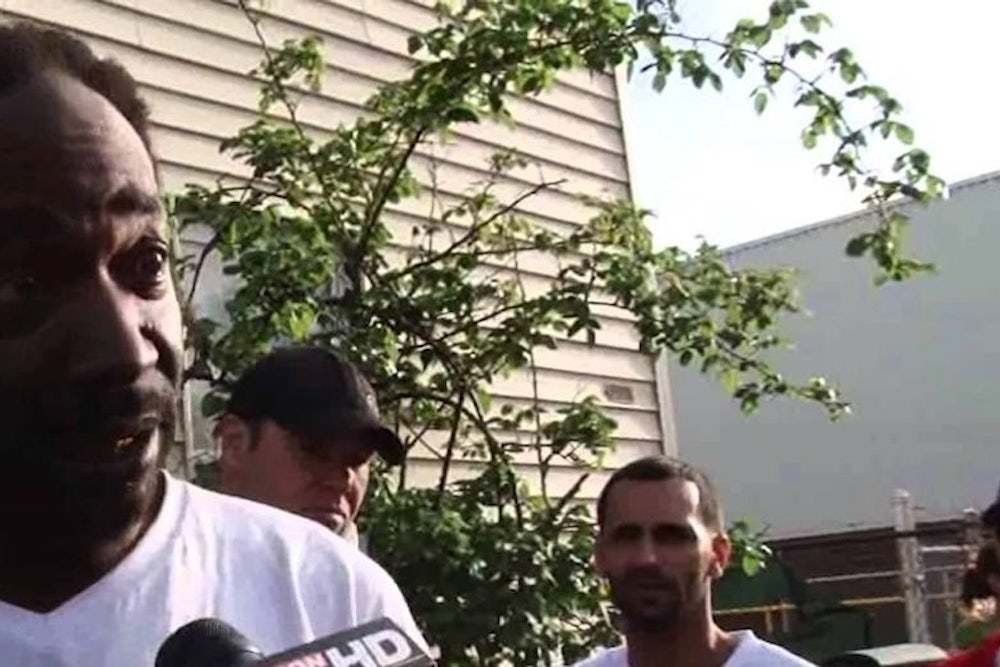At first glance, Charles Ramsey, the man who came to the rescue of an Ohio woman who had been kidnapped 10 years ago, is the stuff of dreams for meme-generators.
In interview after interview Monday and Tuesday, he recounted how he responded to Amanda Berry’s screaming and then helped her and her baby break out of his neighbor’s house (two others were also being held captive in the house). Ramsey offered plenty of details and commentary—he noted that he was just eating a Big Mac at home when it all began—and reporters, starved for information about the three women's captivity and rescue, kept asking for more.
But Ramsey didn’t go viral so much as we—the media, and the public—wanted him to go viral. His interviews with local television stations weren’t obscure videos that organically gained steam online: The rescue was already a national story by Monday night. By midday Tuesday, though, even the most-watched Ramsey clips on YouTube had failed to crack 100,000 views, and most autotuned versions of his remarks had only garnered a few thousand views. And yet, by 6 p.m., CNN had declared him a viral sensation.
The ingredients seemed to all be there: a quotable, charismatic man at the center of a bizarre story. Ramsey also happens to be black, and the Internet and local news stations have a track record of pushing the “hilarious black neighbor," the most prominent example being Antoine Dodson, whose local TV interview about the attempted rape of his sister went truly viral, even before it was autotuned by the Gregory Brothers.
But Dodson’s interview was the story, as far as most of the country was concerned. The rescue of the three women in Ohio, on the other hand, would have gained national headlines irrespective of Ramsey's interview. Ramsey, a restaurant dishwasher, is just an incidental cast member in a much larger story, the horrifying details of which keep trickling out.
People like Ramsey don’t often get humanizing treatment in mass media, which explains the trepidation over his meme-ification. That one person bears the responsibility to represent an entire group of people is an unfortunate reality for those belonging to a minority or marginalized group. America’s history of peddling generalized stereotypes rather than nuanced depictions explains why the line between using memes to highlight Ramsey as an interesting, individual person rather than as an ugly caricature feels so close.
While it may feel uncomfortable to focus on Ramsey's funnier lines, to pretend otherwise—that there was no humor whatsoever in his interviews—is to ignore a big chunk of who Ramsey is. He repeatedly told his tale with a plain-spokenness that feels fully him and unrehearsed; he wasn’t performing. He also expressed exasperation at the mini-media firestorm: When a local TV reporter asked him to tell the story once more, he replied, “Again?!” And his most-quoted line was a refreshingly unsubtle commentary about racism in America: “I knew something was wrong when a little pretty white girl ran into a black man's arms. Something is wrong here—dead giveaway, dead giveaway," he said. As the reporter began to move away, Ramsey finished his thought. "Either she's homeless or she's got problems. That's the only reason she'd run toward a black man."
In a hyper-controlled media environment, people long for that kind of unscripted "real talk" from genuine people who aren’t trying to manipulate their images for personal gain. And that’s a big part of the reason why Ramsey is compelling. He didn’t seek this fame, and so far he’s said he doesn’t want reward money for his actions (and even if he did, we could hardly begrudge him that). Rather than exploring Ramsey just for laughs, a meme done right could be a way of celebrating him for who he is: a hero who helped rescue kidnapped women.
For his part, Ramsey has shrugged off that label. “I'm a Christian and an American and I'm just like you. I bleed the same blood, put my pants on the same way,” he told CNN’s Anderson Cooper Tuesday night. And while Ramsey’s good deed just happened to land him in the middle of a national frenzy, there are actually many like him in America—ordinary folks who, when given the chance, do right by others. Now it’s on us, the producers and consumers of media, to do right by him.
